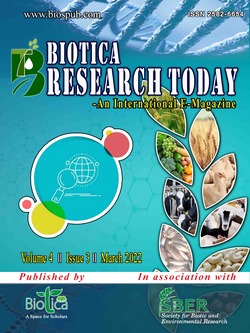
Biochar: Magic Black Carbon for Agricultural and Environmental Sustainability
B.B. Basak*
ICAR-Directorate of Medicinal and Aromatic Plants Research, Anand, Gujarat (387 310), India
Ajoy Saha
Regional Centre of ICAR-Central Inland Fisheries Research Institute, Bangalore, Karnataka (560 089), India
Rohan Sarkar
ICAR-Directorate of Medicinal and Aromatic Plants Research, Anand, Gujarat (387 310), India
DOI: NIL
Keywords: Agricultural benefits, Biochar, Environmental benefits, Soil amendment
Abstract
Biochar is a kind of charcoal having very high surface area, produced by the controlled pyrolysis of organic biomass, can be used as soil amendment which improves soil health with increasing crop production. Biochar is produced from combustion of biomass in controlled way under oxygen-free or oxygen-limited environment. The particular heat during pyrolysis converts organic biomass into biochar with large surface area that enable them to persist in soils with very little biological decay, useful in agricultural perspective. Due to high mean residence time, biochar virtually creates permanent carbon sinks which improves soil health substantially in an environmentally sound manner. The biochar (acts as catalyst) improves intake of nutrients along with water in the plant. Owing to have porous structure together with large surface area, the biochar can retain or adsorb water and various soil nutrients and act as a natural terrain for useful soil microbes to grow.
Downloads
not found
Reference
Basak, B.B., Sarkar, B., Saha, A., Sarkar, A., Mandal, S., Biswas, J.K., Wang, H., Bolan, N.S., 2022. Revamping highly weathered soils in the tropics with biochar application: What we know and what is needed. Science of the Total Environment 822, 153461.
Ding, Y., Liu, Y., Liu, S., Li, Z., Tan, X., Huang, X., Zeng, G., Zhou, L., Zheng, B., 2016. Biochar to improve soil fertility- A review. Agronomy for Sustainable Development 36(2), 1-18.
Glaser, B., Birk, J.J., 2012. State of the scientific knowledge on properties and genesis of Anthropogenic Dark Earths in Central Amazonia (terra preta de Indio). Geochimica et Cosmochimica Acta 82, 39-51.
Lehmann, J., Joseph, S., 2015. Biochar for environmental management: an introduction. In: Lehmann, J., Joseph, S. (Eds.), Biochar for Environmental Management: Science, Technology and Implementation, 2nd ed. Earthscan from Routledge, London, pp. 1-1214.
Saha, A., Basak, B.B., Gajbhiye, N.A., Kalariya, K.A., Manivel, P., 2019. Sustainable fertilization through co-application of biochar and chemical fertilizers improves yield, quality of Andrographis paniculata and soil health. Industrial Crops and Products 140, 111607.
